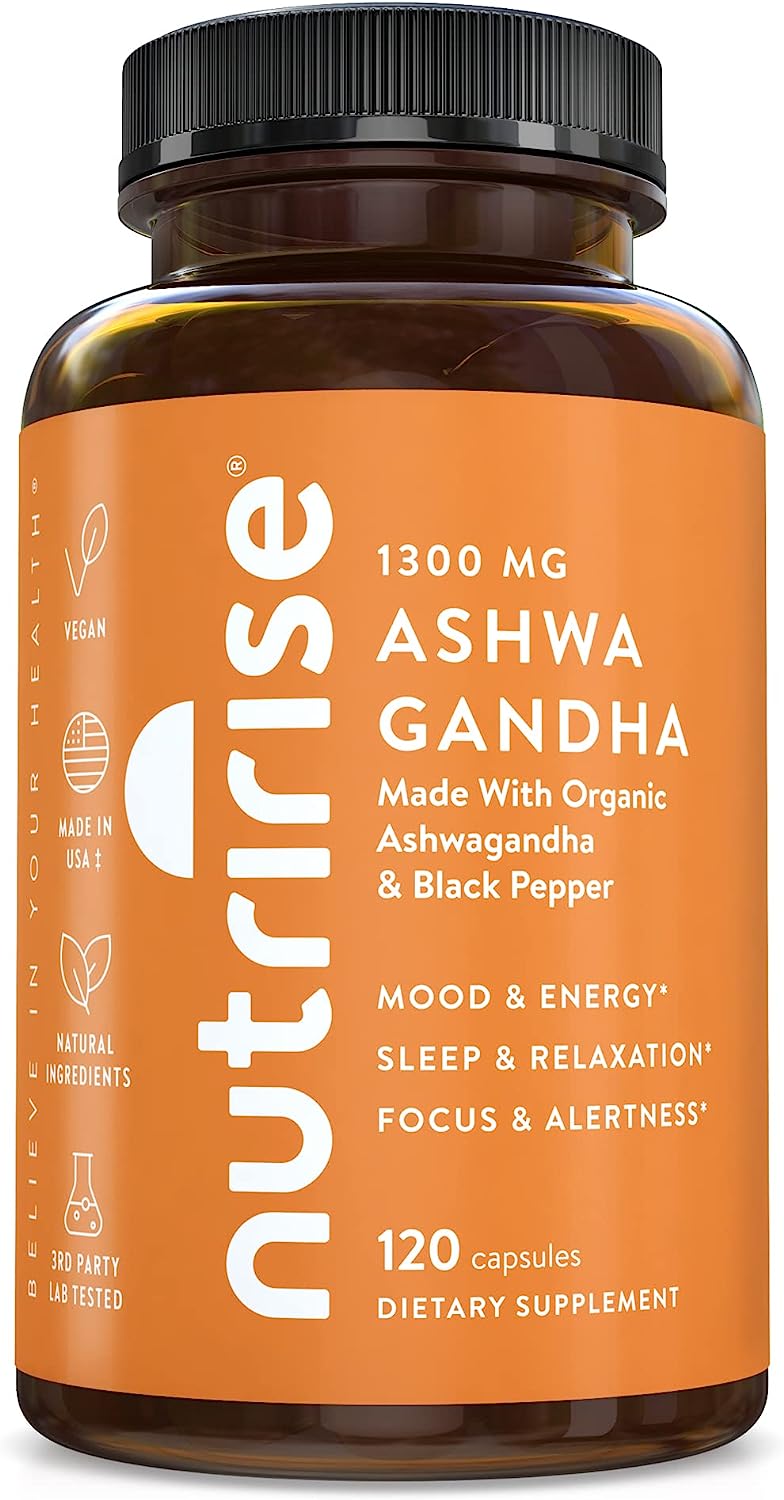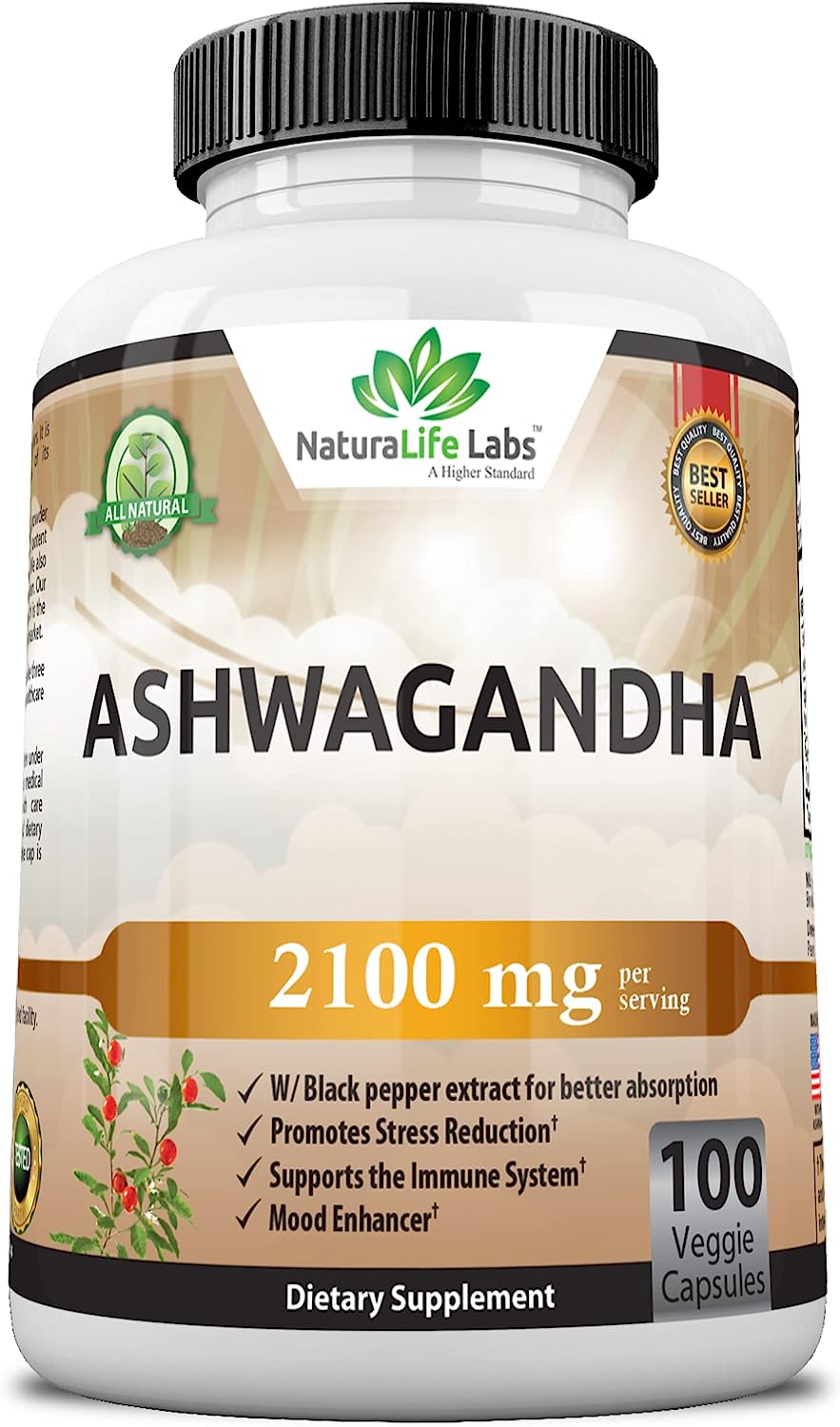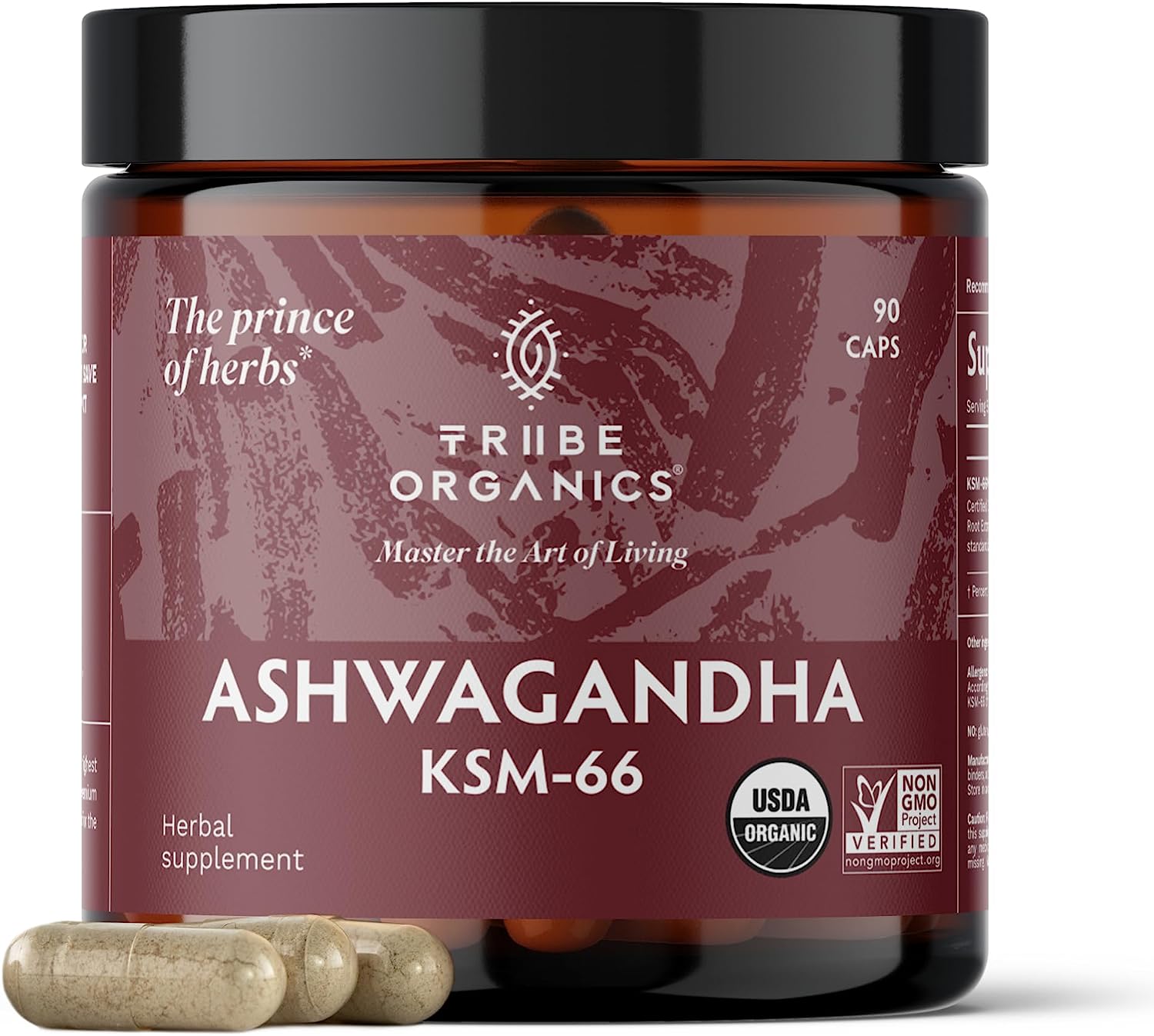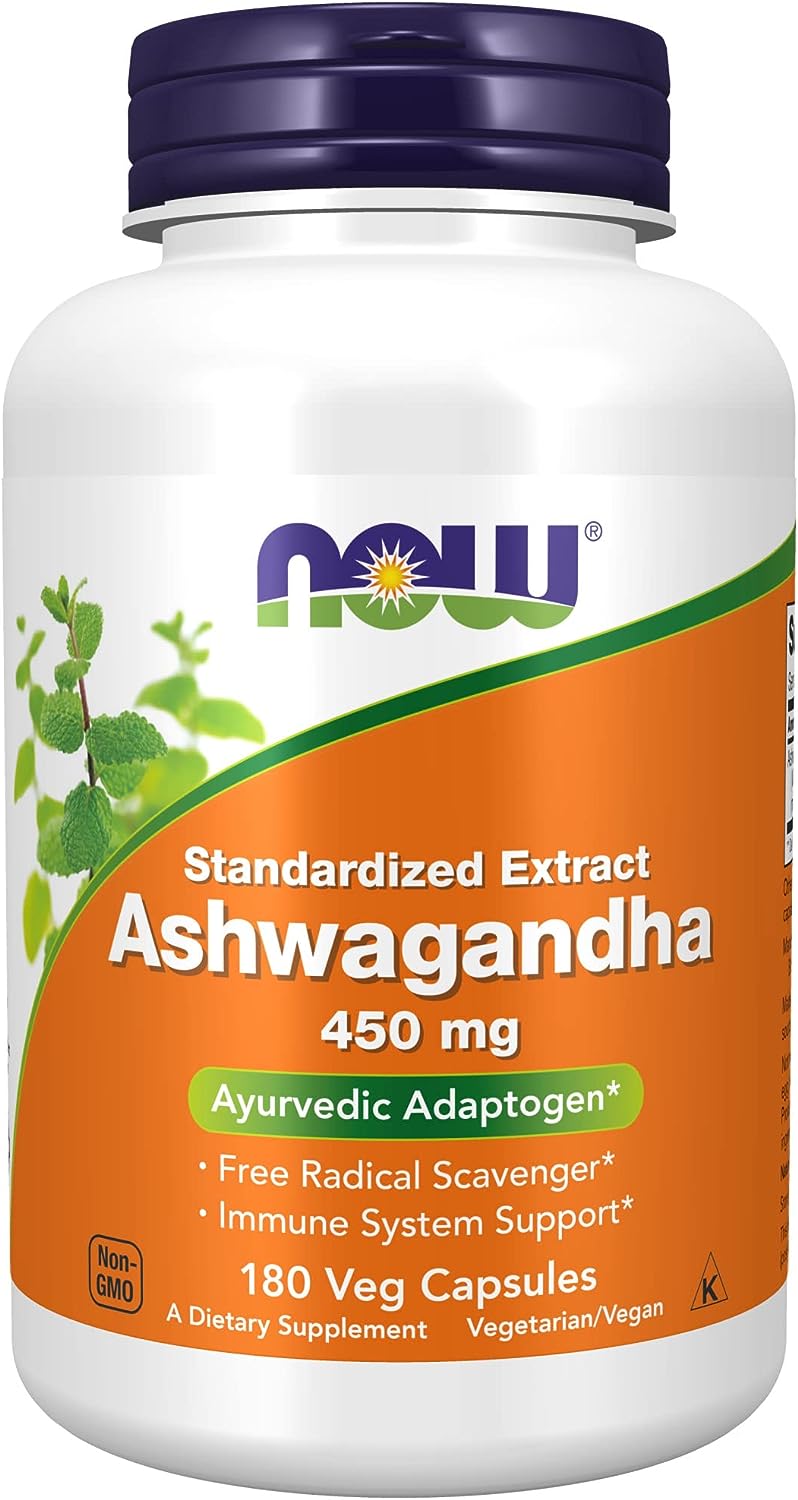In a world filled with stress and anxiety, finding effective and safe remedies is paramount. While conventional medications for anxiety disorders often come with unwanted side effects and high discontinuation rates, the soothing embrace of Ashwagandha extract offers a promising alternative. This ancient herb has shown remarkable potential in reducing anxiety, mitigating stress levels, and providing a much-needed respite from the burdens of daily life. Join us on a journey to uncover the anxiolytic and anti-stress effects of Ashwagandha and discover a natural path to tranquillity [1].
Benefits of ashwagandha for anxiety
- A Natural Ally for Anxiety Treatment: Ashwagandha extract has emerged as a valuable supporter in the treatment of Generalized Anxiety Disorder (GAD) when used alongside Selective Serotonin Reuptake Inhibitors (SSRIs). This powerful combination has demonstrated the ability to alleviate anxiety and stress levels while effectively regulating morning cortisol and DHEA-S levels [2,3,4]. Say goodbye to the restless nights and worrisome thoughts as Ashwagandha lends its comforting hand in your pursuit of calm.
- Quieting the Storm, The Mechanisms at Play: Ashwagandha’s anxiolytic effects stem from its remarkable ability to dampen the activity of the hypothalamic-pituitary-adrenal (HPA) axis, a key regulator of stress response. By soothing this intricate system, Ashwagandha sets the stage for tranquility. Additionally, its anti-inflammatory and antioxidant properties contribute to the improvement of mood, unveiling a serene oasis in the midst of life’s storm [5].
- A Holistic Approach to Well-being: The benefits of Ashwagandha supplementation extend beyond anxiety relief. Studies involving both humans and animals have unraveled its positive impact on memory, attention, sleep quality, and overall psychological well-being. Moreover, Ashwagandha showcases potential in alleviating symptoms of schizophrenia and enhancing cognitive function, offering a comprehensive approach to mental well-being [6,7,8,12,13]. It’s time to embrace the holistic potential of Ashwagandha and nurture your mind.
- A Gentle Touch, Unmatched by Others: One of the key components responsible for Ashwagandha’s anxiolytic action is ferulate docosanol (DF). This remarkable compound acts on the GABA-A receptor complex, providing a calming influence without the typical side effects associated with benzodiazepines [9,10]. Experience the gentleness and efficacy of Ashwagandha as it embraces your nervous system with unparalleled tenderness.
- A Promising Future: While the exact mechanisms of Ashwagandha’s anxiolytic effects continue to be explored, clinical and experimental studies consistently support its efficacy in treating anxiety disorders [8]. This natural wonder showcases its ability to modulate neurotransmitter levels, such as increasing GABA and decreasing dopamine, providing potential benefits for conditions like alcohol dependence [11]. Let the future unfold as Ashwagandha takes its rightful place in the realm of anxiety management.
- Embrace the Serenity: In a world often characterized by stress and anxiety, Ashwagandha offers solace. Let its anxiolytic effects wash over you, gently easing your worries and calming your mind. Discover the tranquility that awaits in the arms of this ancient herb, and bid farewell to unwanted stress. Embrace Ashwagandha as your natural ally on the path to inner peace and well-being.
Nutririse

Organic Ashwagandha Root Capsules with Black Pepper, 1300mg
18.95$
- Clinically Proven
- 5% Withanolide Content
- Benefits for All Ages and Athletes
- Organic Ashwagandha
- Green Chemistry Approach
Natural Life labs

Organic Ashwagandha 2,100 mg – 100 Vegan Capsules Pure Powder and Root Extract
$15.95$
- 2,100 mg per serving
- 2.5% withanolides
- No fillers, preservatives, gluten, or GMOs
- Vegan
- Manufactured in a FDA registered facility
Tribe organics

TRIBE ORGANICS Ashwagandha KSM 66 –
600 mg Pure Organic Root Powder Extract Ayurvedic Supplement
$24.97$
- Clinically Proven
- Standardized 5% Withanolide Content
- Benefits for All Ages and Athletes
- Award-Winning Product
NOW
Ashwagandha

NOW Supplements, Ashwagandha (Withania somnifera) 450 mg (Standardized Extract)
14$
- Standardized Extract
- Vegetarian Formula
- Supports Healthy Immune System
- Non-GMO
- Vegan/Vegetarian
- GMP Quality Assured
- Packaged in the USA
Side effects of FDA approved medications for Anxiety
People with persistent anxiety often benefit from medications to help manage symptoms. Options include beta blockers and antidepressants. A doctor can help decide on the best option.
The term anxiety encompasses feelings of worry, fear, and unease. According to several large surveys, up to 33.7% of people experience some form of anxiety disorder during their lifetime [14].
This article discusses the main types of anxiety medication approved by FDA and lists their risks and side effects. Several types of medication can treat the symptoms of anxiety. According to the Anxiety and Depression Association of America (ADAA), the four major classes of drugs for anxiety disorders are [15]:
| Type | Symptoms | Side effects |
| Selective serotonin reuptake inhibitors (SSRI) | Depression, Anxiety, Obsessive-Compulsive Disorder | Blurry vision, dizziness, drowsiness, dry mouth, feeling agitated or restless, headaches, nausea, sexual problems or erectile dysfunction, sleep problems, upset stomach, weight gain |
| Serotonin-norepinephrine reuptake inhibitors (SNRIs) | Depression, Anxiety, Chronic Pain | Constipation, dizziness, drowsiness or fatigue, dry mouth, headaches, increased blood pressure, loss of appetite, nausea, sexual problems or erectile dysfunction, sleep problems, sweating more than usual, an upset stomach, weight gain |
| Tricyclic antidepressants (TCAs) | Depression | Blurry vision, constipation, difficulty urinating, dry mouth, drowsiness, increase in appetite, lightheadedness, low blood pressure after standing up, sexual problems or erectile dysfunction, sweating more than usual, tremors, weight loss or gain |
| Benzodiazepines | Anxiety | Blurry vision, confusion, dizziness, drowsiness or fatigue, headaches, loss of memory or concentration, problems with balance, coordination, or speech, an upset stomach, anxiety and restlessness, depression, sleep problems, sweating, seizures, addiction, cognitive decline, hip fractures |
| Beta blocker | Cold hands and feet, depression, extreme tiredness, low blood pressure, shortness of breath, sleep problems, weight gain | |
| Buspirone | Blurry vision, diarrhea, dizziness, drowsiness, dry mouth, fatigue, headaches, muscle pains, nausea, poor concentration, restlessness or nervousness, sleep problems, sweating, weakness | |
| Monoamine oxidase inhibitors (MAOIs) | Depression, Panic | Constipation, diarrhea, difficulty urinating, dizziness, drowsiness, dry mouth, headaches, low blood pressure, nausea, sexual dysfunction, sleep problems, sweating, weight gain |
In 2004, the FDA implemented a crucial measure by mandating a black-box warning on all antidepressants regarding the risk of suicide in children and young adults [16]. It is important to note that individuals under the age of 25 may potentially experience an elevation in suicidal thoughts and behaviors while undergoing antidepressant treatment [17].
Efficacy of Ashwagandha in treatment of stress and anxiety
Ashwagandha is a widely used herb in traditional medicine systems like Ayurveda. Its reputation as an adaptogen has made it increasingly popular worldwide. This surge in popularity has led to more scientific research on its effects, particularly its potential role in managing stress, anxiety, depression, and insomnia [18].
Here are some key findings on the metabolic effects of Ashwagandha in reducing these conditions:
- One way Ashwagandha reduces stress is by reducing glucocorticoids (stress hormones) and modulating the immune system.
- Different forms of Ashwagandha root have been shown to decrease the levels of stress hormones like cortisol and corticosterone in response to stress.
- Ashwagandha has been found to reverse the decrease in adrenal cortisol content caused by stress.
- Ashwagandha root extract was able to decrease the levels of corticosterone in the hippocampus, a region of the brain associated with stress response.
- Ashwagandha root powder has been shown to increase the count of white blood cells and the percentage of lymphocytes, while reducing the levels of the pro-inflammatory cytokine IL-6.
- Certain compounds present in ashwagandha interact with and modulate GABAA receptors, which are involved in regulating anxiety and stress.
- Ashwagandha exhibits antioxidant and anti-inflammatory activities, which contribute to its stress-reducing effects.
- Ashwagandha also has chronomodulatory effects on the brain, meaning it can help regulate the body’s internal clock.
These findings highlight the potential of Ashwagandha in supporting mental well-being and managing stress-related conditions. Further research is needed to fully understand the mechanisms involved and to determine the optimal use of Ashwagandha for these purposes.
FAQs
Here are 6 FAQs on ashwagandha’s anxiolytic effects for reducing stress and anxiety:
Q: How does ashwagandha help with anxiety?
A: Ashwagandha contains active withanolides that help regulate neurotransmitters like serotonin and dopamine to improve mood and reduce anxiety. It also reduces cortisol levels and inflammation in the brain.
Q: What is the optimal dosage for anxiety relief?
A: Studies showing anxiety-relieving effects have used between 300-600 mg of high quality Ashwagandha extract once or twice daily. Start low and gradually increase over 2-4 weeks.
Q: How long before noticing Anxiolytic effects?
A: It can take 2-6 weeks of consistent supplementation to notice significant improvements in anxiety levels. Maximum benefits may take 2-3 months as it works to rebuild neurotransmitter balance.
Q: Are there any side effects or precautions?
A: Ashwagandha is generally well tolerated. High doses may cause stomach upset, drowsiness or irritability. Avoid taking with sedatives or thyroid medications. Not enough data exists on safety for pregnant or breastfeeding women.
Q: Can it be combined with anti-anxiety medications?
A: There are no known negative interactions but check with your doctor first. Ashwagandha may allow lowering prescription med dosage over time under medical supervision.
Q: Is Ashwagandha effective for social anxiety?
A: Human studies indicate Ashwagandha significantly improves symptoms of social anxiety, including restlessness, fatigue, nervousness and cognitive dysfunction when taken for at least 60 days. It may help treat social phobia.
References
- Yaribeygi, H.; Panahi, Y.; Sahraei, H.; Johnston, T.P.; Sahebkar, A. The impact of stress on body function: A review. EXCLI J. 2017, 16, 1057–1072.
- Fuladi, S.; Emami, S.A.; Mohammadpour, A.H.; Karimani, A.; Manteghi, A.A.; Sahebkar, A. Assessment of the Efficacy of Withania somnifera Root Extract in Patients with Generalized Anxiety Disorder: A Randomized Double-blind Placebo-Controlled Trial. Curr. Rev. Clin. Exp. Pharmacol. 2021, 16, 191–196.
- Salve, J.; Pate, S.; Debnath, K.; Langade, D. Adaptogenic and Anxiolytic Effects of Ashwagandha Root Extract in Healthy Adults: A Double-blind, Randomized, Placebo-controlled Clinical Study. Cureus 2019, 11, e6466.
- Pratte, M.A.; Nanavati, K.B.; Young, V.; Morley, C.P. An alternative treatment for anxiety: A systematic review of human trial results reported for the Ayurvedic herb Ashwagandha (Withania somnifera). J. Altern. Complement. Med. 2014, 20, 901–908.
- Karasek, M. Dehydroepiandrosterone (DHEA) in postmenopausal women. Prz. Menopauzalny 2005, 9, 8.
- Gopukumar, K.; Thanawala, S.; Somepalli, V.; Rao, T.S.S.; Thamatam, V.B.; Chauhan, S. Efficacy and Safety of Ashwagandha Root Extract on Cognitive Functions in Healthy, Stressed Adults: A Randomized, Double-Blind, Placebo-Controlled Study. Evid.-Based Complement. Altern. Med. 2021, 2021, 1–10.
- Kaur, T.; Singh, H.; Mishra, R.; Manchanda, S.; Gupta, M.; Saini, V.; Sharma, A.; Kaur, G. Withania somnifera as a potential anxiolytic and immunomodulatory agent in acute sleep deprived female Wistar rats. Mol. Cell. Biochem. 2017, 427, 91–101.
- Gannon, J.M.; Brar, J.; Rai, A.; Chengappa, K.N.R. Effects of a standardized extract of Withania somnifera (Ashwagandha) on depression and anxiety symptoms in persons with schizophrenia participating in a randomized, placebo-controlled clinical trial. Ann. Clin. Psychiatry Off. J. Am. Acad. Clin. Psychiatr. 2019, 31, 123–129.
- Candelario, M.; Cuellar, E.; Reyes-Ruiz, J.M.; Darabedian, N.; Feimeng, Z.; Miledi, R.; Russo-Neustadt, A.; Limon, A. Direct evidence for GABAergic activity of Withania somnifera on mammalian ionotropic GABAA and GABAρ receptors. J. Ethnopharmacol. 2015, 171, 264–272.
- Maccioni, R.; Cottiglia, F.; Maccioni, E.; Talani, G.; Sanna, E.; Bassareo, V.; Kasture, S.B.; Acquas, E. The biologically active compound of Withania somnifera (L.) Dunal, docosanyl ferulate, is endowed with potent anxiolytic properties but devoid of typical benzodiazepine-like side effects. J. Psychopharmacol. 2021, 35, 1277–1284.
- Marathe, P.A.; Satam, S.D.; Raut, S.B.; Shetty, Y.C.; Pooja, S.G.; Raut, A.A.; Kale, P.P.; Rege, N.N. Effect of Withania somnifera (L.) Dunal aqueous root extract on reinstatement using conditioned place preference and brain GABA and dopamine levels in alcohol dependent animals. J. Ethnopharmacol. 2021, 274, 113304.
- Chengappa, K.N.R.; Brar, J.S.; Gannon, J.M.; Schlicht, P.J. Adjunctive use of a standardized extract of Withania somnifera (Ashwagandha) to treat symptom exacerbation in schizophrenia: A randomized, double-blind, placebo-controlled study. J. Clin. Psychiatry 2018, 79, 22496.
- Remenapp, A.; Coyle, K.; Orange, T.; Lynch, T.; Hooper, D.; Hooper, S.; Conway, K.; Hausenblas, H.A. Efficacy of Withania somnifera supplementation on adult’s cognition and mood. J. Ayurveda Integr. Med. 2022, 13, 100510.
- Bandelow, B., & Michaelis, S. (2015). Epidemiology of anxiety disorders in the 21st century. Dialogues in clinical neuroscience, 17(3), 327–335. https://doi.org/10.31887/DCNS.2015.17.3/bbandelow
- https://adaa.org/find-help/treatment-help/medication-options
- https://www.fda.gov/drugs/postmarket-drug-safety-information-patients-and-providers/suicidality-children-and-adolescents-being-treated-antidepressant-medications
- https://www.frontiersin.org/articles/10.3389/fpsyt.2019.00294/full
- Speers, A. B., Cabey, K. A., Soumyanath, A., & Wright, K. M. (2021). Effects of Withania somnifera (Ashwagandha) on Stress and the Stress- Related Neuropsychiatric Disorders Anxiety, Depression, and Insomnia. Current neuropharmacology, 19(9), 1468–1495. https://doi.org/10.2174/1570159X19666210712151556